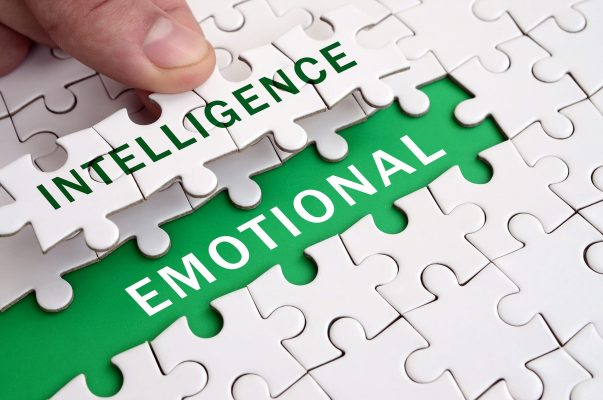Emotional intelligence is the key to personal and professional success.

What is emotional intelligence (EQ)?
noun e·mo·tion·al in·tel·li·gence
the capacity to be aware of, control, and express one’s emotions, and to handle interpersonal relationships judiciously and empathetically.
Emotion psychology defines EQ:
It involves recognizing and understanding emotions – your own, and others, including:
- perception of emotions
- reasoning with emotions
- understanding emotions
- management of emotions
People have begun to study how thoughts and emotions interact and influence how people behave and make decisions. Experts appropriately acknowledge the fact that people are emotional.
Foundational components of emotional intelligence include:
- social skills
- self-awareness
- empathy
- self-management
- motivation
Why is EQ important?

Decisions are greatly impacted by emotions. Thus, a high EQ enables you to understand others’ emotions, manage and convey your feelings, and form healthy relationships.
A high EQ helps solve problems efficiently – even with the weight of deadlines and other pressures.
Low EQ is a problem when people:
- won’t take responsibility for mistakes
- make it a challenge to work as a team
- are either passive or aggressive when communicating
- are not assertive and are unable to accept constructive criticism
High EQ benefits the workplace when people:
- solve problems
- make difficult decisions appropriately
- keep a level head under pressure
- have greater empathy, listen, reflect, & react positively to other opinions
Diving Further Into Emotional Intelligence
In fact, attaining emotional intelligence begins with becoming self-aware and recognizing and naming your feelings. Over time you’re better able to regulate your emotions and adapt to changing situations. Don’t stifle your feelings, but also avoid impulsivity. For instance, someone with a high EQ can express feelings appropriately and constructively. Your initial step of learning this is to bring attention to it and practice.
The more you understand your own emotions the more you can recognize emotions in others. Hence, this leads to improved social skills, solidarity with your team, and better communication in the workplace.
A high EQ gives you the ability to recognize your own reactions to other people’s expressions of emotion. This increased empathy allows you to perceive a new level of relationship dynamics and respond in a thoughtful rather than reactive way.
Additionally, a high EQ is critical to conflict management. You can listen to how others respond to one another on an emotional level and more quickly understand what is really going on. Then, it’s much easier to help people be heard and to guide clear communication which can lead to compromise.
To summarize, begin to address this essential management skill with careful self-examination. Find a trusted friend for feedback. Review past dustups and critically evaluate your contribution to past conflicts. If self-help is not your thing you can get the help of a coach!
If you want to learn more about EQ and how it can help you achieve success in both your professional and personal life our award-winning coaches at the Ignite Your Potential Centers offer complimentary 25-minute phone sessions.
We are the #1 career coaches in San Francisco and Los Angeles, let us show you how we earned that praise.



